Research Round-up – September 2019
Welcome to the latest instalment of our new monthly feature series throwing the spotlight on our research success stories.
Dr Sunjie Ye, who has created the world’s thinnest gold. Picture by Dan Rowlands/SWNS.COM

The strength of our research is in making a real and telling difference to the world around us, by working across traditional boundaries to find innovative solutions to some of the greatest challenges facing society today.
Here we highlight some of latest projects being pioneered by the expertise and efforts of the highly talented research community at Leeds.
From grant awards to examples of outstanding interdisciplinary work and best practice, we’re keen to showcase your research achievements. See the foot of this article for details of how you can get involved.
Featured in this month’s round-up:
- New data hub will improve cancer care
- Future leaders to deliver global impact
- Better predictions of future climate change
- Rare molecule weighing in on the birth of planets
- Scientists with the Midas touch
- Boosting health technology innovation
- Antiseptic resistance in bacteria could lead to next-gen plastics
- Early education setback for summer premature births
- New chapter for Ireland’s most exciting literary voices
- Call for Student Education Conference 2020 papers
- ESRC Festival of Social Science
- Teacher testers wanted for programming assessment tool
- Research Development Funding applications
- Research Spotlight video
- How to feature in future round-ups
 Professor Geoff Hall, who will be the Clinical Director of DATA-CAN
Professor Geoff Hall, who will be the Clinical Director of DATA-CAN
New data hub will improve cancer care
Researchers from Leeds are collaborating on a new national data hub that aims to transform how cancer information from across the UK can be used to improve patient care.
The pioneering initiative has now been awarded £4.5 million to deliver DATA-CAN – the Health Data Research Hub for Cancer.
The project will work closely with patients to bring their clinical data together and use this information to help develop improved cancer treatments, give patients faster access to clinical trials and understand how we can improve NHS cancer services.
Professor Geoff Hall, from the University and Leeds Teaching Hospitals NHS Trust, will be the Clinical Director of DATA-CAN. He said: “This project will help empower the NHS to use data and analytics to optimise care for patients, while supporting universities and companies who work with us to discover and develop new treatments.
“A key focus of the hub will be to support the development and delivery of clinical trials and to identify which trials are suitable for individual patients. By doing so, we will ensure patients have access to new, potentially life-saving treatments.”
Read the full story on For Staff.
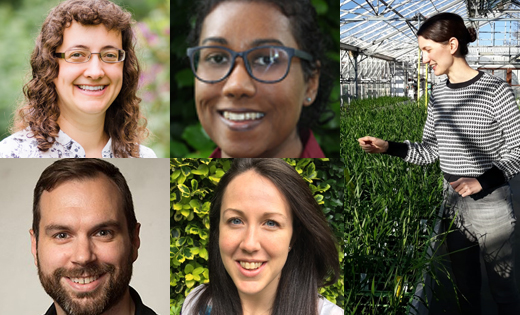 Five new Future Leader Fellows have been announced from Leeds
Five new Future Leader Fellows have been announced from Leeds
Future leaders to deliver global impact
Five more Leeds researchers have received a prestigious fellowship aimed at tackling global challenges.
Universities Minister, Chris Skidmore MP, recently announced the next cohort of 78 Future Leader Fellows, which includes Dr Laura Carter from the Faculty of the Environment; Dr Richard Mann from the Faculty of Engineering and Physical Sciences; Dr Izzy Jayasinghe and Dr Laura Dixon, both from the Faculty of Biological Sciences; and Dr Karen Michelle Davies, who will join the same Faculty in January.
Funded by UK Research and Innovation (UKRI), the Future Leaders Fellowship provides funding and resources to the best early-career researchers and innovators from across universities, business and other organisations.
Mr Skidmore said: “Delivering on our research and innovation ambitions means putting people first, whether they are just starting out in their career or are leading major projects in academia or industry.
“These inspirational Future Leaders Fellows will generate the ideas of the future, helping to shape science and research for the 21st century. But to realise the full potential of these discoveries, their ideas need to be taken out of the lab and turned into real products and services, where they can actually change people’s lives for the better.”
The Fellows’ ground-breaking work forms a key part of maintaining the UK’s status at the forefront of cutting-edge research and innovation long into the future.
Read the full story on For Staff.
 British Antarctic Survey Twin Otter aircraft will be used during the field campaign to better predict future climate change. Picture: BAS Images
British Antarctic Survey Twin Otter aircraft will be used during the field campaign to better predict future climate change. Picture: BAS Images
Better predictions of future climate change
Scientists from the National Centre for Atmospheric Science (NCAS) and Leeds are leading the UK contribution to a £2.5 million international initiative aimed at reducing uncertainties in the projections of future climate change.
Currently, calculations of global warming disagree by several degrees Celsius. These uncertainties in the predictions of temperature increase have massive implications for the impacts of global warming on living systems and human activities.
The largest cause of disagreements between predictions of global warming is the challenge of accurately representing the feedbacks between clouds, convection, atmospheric circulation and climate. The new project, called EUREC4A (Elucidating the Role of Clouds-Circulation Coupling in Climate), is designed to understand the behaviour of these clouds and their role in climate change.
Professor Alan Blyth, from NCAS, which is based at Leeds, said: “Trade-wind cumulus clouds are ubiquitous over the tropical oceans, and play an important role in climate because of their influence on the Earth's radiation budget – for example, by reflecting sunlight.
“The way in which these clouds respond to global warming is very uncertain, and this explains most of the differences between climate models under scenarios with increased greenhouse gas concentrations. In particular, a better understanding is required of the mechanisms that determine the amount of low-level clouds.”
A major international field campaign will take place between 20 January and 20 February 2020, with operations based out of Barbados. EUREC4A involves the deployment of three research aircraft, in coordination with surface-based measurements from the Barbados Cloud Observatory and several ships, to quantify the distribution of clouds as a function of their large-scale environment. These measurements will be combined with satellite remote sensing, state-of-the-art turbulence-resolving modelling and an array of autonomous vehicles (drones).
The Caribbean Meteorological Organisation (CMO) will support the field campaign through provision of bespoke weather forecasts to the project, and two knowledge-exchange workshops will be held to feed the insight, experience and knowledge of CMO forecasters into the research programme.
The Natural Environment Research Council (NERC) has awarded the project £2.5 million, with the Leeds slice worth £1.4 million.
The UK NERC Large Grant team in Leeds consists of Professor Blyth, NCAS, and Professor Doug Parker, School of Earth and Environment (SEE), as well as Drs. Ralph Burton, Alan Gadian, John Marsham and Phil Rosenberg (NCAS) and Drs. Steven Boeing, Zhiqiang Cui and Leif Denby (SEE). The UK partners are the University of Manchester, the British Antarctic Survey and the Met Office.
Scientific results from EUREC4A will be used in the short term to reduce the uncertainties in global climate change projections. Longer-term, the knowledge gained in the project will change the way these processes are represented in the models. Indeed, the team at NCAS and Leeds is currently working with the Met Office in the development of its new model for convective clouds processes.
 ALMA radio telescope in the Atacama desert in the Andes, Chile
ALMA radio telescope in the Atacama desert in the Andes, Chile
Rare molecule weighing in on the birth of planets
Astronomers have discovered a rare molecule in the dust and gas disc around a young star – and it may provide an answer to one of the conundrums facing astronomers.
The star, named HD 163296, is located 330 light years from Earth and formed during the past six million years.
It is surrounded by a disc of dust and gas – a so-called protoplanetary disc. It is within these discs that young planets are born. Using a radio telescope in the Atacama Desert in Chile, researchers were able to detect an extremely faint signal showing the existence of a rare form of carbon monoxide, known as an isotopologue (13C17O).
The detection has allowed an international collaboration of scientists, led by Leeds, to measure the mass of the gas in the disc more accurately than ever before. The results show that disc is much heavier – or more ‘massive’ – than previously thought.
Alice Booth, a PhD researcher at Leeds who led the study, said: “Our new observations showed there was between two and six times more mass hiding in the disc than previous observations could measure.
“This is an important finding in terms of the birth of planetary systems in discs – if they contain more gas, then they have more building material to form more massive planets.”
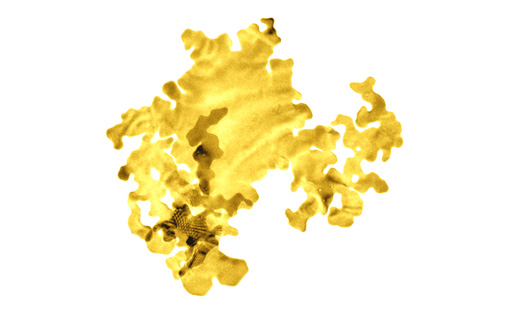 Creating a new form of gold just two atoms thick
Creating a new form of gold just two atoms thick
Scientists with the Midas touch
Scientists at Leeds have created the world’s thinnest gold, which is just two atoms thick.
The breakthrough represents a landmark in the development of ultra-thin materials.
Dr Sunjie Ye is a physicist investigating the mind-bogglingly tiny building blocks of new and novel materials – she works with objects that are smaller than a nanometre, which is one billionth of a metre. To put that in context, a strand of human DNA is 2.5 nanometres in diameter.
To visualise and measure these microscopic materials, she relies on electron and atomic force microscopes, and the expert teams needed to run them and interpret the results.
The reality of nanotechnology is that to investigate the very small, you first have to get big with the equipment that allows detailed exploration of the atomic landscape.
Leeds is internationally acclaimed for its research in this field. It runs the Bragg Centre, where academics from a range of disciplines collaborate on materials research. The Centre has access to some of the best facilities in the world, including electron microscopes, an x-ray spectroscopy suite and a photonics laboratory – cutting-edge equipment that allows scientists to design and investigate materials of the future.
Some of the facilities at the Bragg Centre have been funded by the Henry Royce Institute, a partnership of nine academic and scientific institutions involved in developing advanced materials. Leeds has joint responsibility for the ‘Atoms to Devices’ research theme.
Dr Ye is a post-doctoral research fellow in the Molecular and Nanoscale Physics Group, as well as Leeds Institute of Medical Research.
Her discovery came as she was developing gold nanoparticles for use in medical devices.
She said: "We had prepared a sample and under an atomic force microscope, an interesting picture started to develop. An atomic force microscope measures the mechanical characteristics of an object by running a probe across its surface, and from that data you can determine its thickness. It was indicating the thickness was composed of two layers of gold atoms aligned on top of one another.
“I began to think – is this just a fluke result or have we created a method to fabricate this ultra-thin gold? I immediately set up further experiments to see if I could repeat the synthesis.”
In fact, she was able to fabricate an ultra-thin gold sheet many times during subsequent weeks and months. She describes it as an act of serendipity. The researchers have now filed for a patent to protect their work.
Professor Stephen Evans, who heads the Molecular and Nanoscale Physics Group in the School of Physics and who oversaw the research, said: “We haven’t identified all its properties as yet. That makes it exciting because there are predictions that sometimes the gold nanosheet could behave as a semi-conductor – that would mean it could have important applications in electronics.”
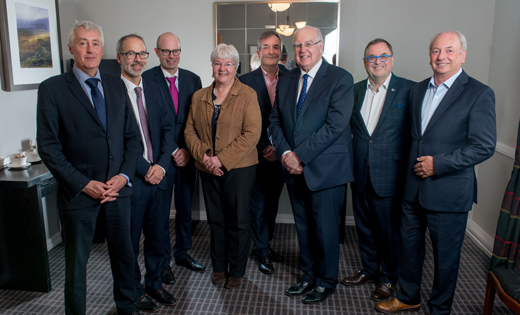 Representing Leeds City Region healthtech MoU partners (from left) are David McBeth (University of York), Rob Webster (West Yorkshire and Harrogate Health and Care Partnership), Liam Sutton (University of Bradford), Liz Towns-Andrews (University of Huddersfield), Peter Slee (Leeds Beckett University), Sir Alan Langlands (University of Leeds), Roger Marsh (Leeds City Region Enterprise Partnership) and Peter Ellingworth (ABHI)
Representing Leeds City Region healthtech MoU partners (from left) are David McBeth (University of York), Rob Webster (West Yorkshire and Harrogate Health and Care Partnership), Liam Sutton (University of Bradford), Liz Towns-Andrews (University of Huddersfield), Peter Slee (Leeds Beckett University), Sir Alan Langlands (University of Leeds), Roger Marsh (Leeds City Region Enterprise Partnership) and Peter Ellingworth (ABHI)
Boosting health technology innovation
More than three million citizens across the Leeds City Region will benefit as senior leaders from the healthtech industry – including the University – announce a new collaboration.
Organisations including the regional enterprise partnership, the NHS, local authorities and four other universities in the region have signed a memorandum of understanding (MoU) to drive forward new approaches in improving patient and population health and care through better and faster healthtech innovation.
The move also aims to radically speed up the region’s productivity and economic growth in the sector, which is seeing an unprecedented rise across the UK and globally.
John Fisher, Professor of Mechanical Engineering at Leeds, said: “This MoU signals an important step towards embracing the opportunities and realising the ambitions set out in the Government’s Industrial Strategy.
“It paves the way for us to reduce fragmentation, further harness expertise and capability and radically strengthen the Leeds City Region’s position as a leading global player in healthtech.
“Each partner will play their part in helping address and overcome the barriers to innovation. By working together in a new, focussed and coordinated way, we will accelerate radical improvements in patient care, health service efficiency and drive economic growth and productivity across the region and the UK.”
The MoU is the first of its kind in the region and was signed on behalf of the University by Vice-Chancellor, Sir Alan Langlands.
He said: “The University has an outstanding track record of innovation research in medical engineering, technology, manufacturing and regenerative therapies, and a strong commitment to industry engagement and the creation of new healthtech companies.
“Alongside our partners, we want to improve health and care across the Region and unlock the vast economic potential of this important sector.”
 Producing plastic using bacteria would dramatically reduce its carbon footprint
Producing plastic using bacteria would dramatically reduce its carbon footprint
Antiseptic resistance in bacteria could lead to next-gen plastics
The molecular machinery used by ‘superbugs’ to resist chemicals designed to kill them could also help produce precursors for a new generation of nylon and other polymers, according to new research.
Scientists from Leeds have collaborated with Australian researchers to identify ancient protein pumps that make infectious bacteria tough to treat, but which could be key to developing new environmentally-friendly polymers.
Bacteria, called ‘superbugs’, that are unaffected by antiseptics and antibiotics are a growing problem, but exactly how they develop resistance is often not fully understood.
Previous research by Leeds and Macquarie University in Australia revealed how a bacterium called Acinetobacter baumannii resisted chlorhexidine, a powerful hospital-grade antiseptic listed by the World Health Organisation as an “essential medicine”.
A. baumannii’s secret weapon, they found, is a protein called AceI, which sits on its surface and pumps out any chlorhexidine that gets inside. That was a surprise to researchers because the protein has existed for millions of years longer than the antiseptic.
“Resistance to artificial antiseptics appears to be a lucky accident for the bacteria, and it could also be useful for humans,” says Professor Ian Paulsen, from Macquarie University, one of the leaders of the research group.
Professor Peter Henderson, from the School of Biomedical Sciences at Leeds, added: “We’ve shown in this study that AceI can transport a substance called cadaverine out of the cell, and that is already used in the manufacture of plastics today.
“It may still be years away, but producing plastic using bacteria would dramatically reduce its carbon footprint, as it would avoid the need to use the petrochemicals that we rely on today.”
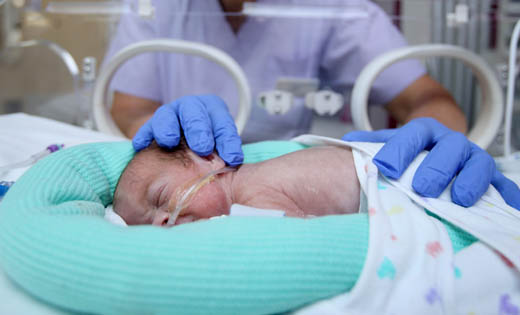 Caring for a baby in the Neonatal Unit at Bradford Royal Infirmary. Picture courtesy of Born in Bradford
Caring for a baby in the Neonatal Unit at Bradford Royal Infirmary. Picture courtesy of Born in Bradford
Early education setback for summer premature births
Children born as little as three weeks premature – who consequently fall into an earlier school year – are at increased risk of experiencing setbacks in their education after their first year of school.
Previous research has already shown that children born severely prematurely – more than ten weeks early – are more likely to suffer educational problems. But the new findings highlight the disadvantage children born moderate-to-late premature may face, who were thought to be at a lower risk.
New research, from the University and Born in Bradford, looked at the complex interplay between the educational disadvantage of being born moderately premature, and when during the year a child was born, to understand whether extra support might be necessary for some children.
This was in response to conversations with schools participating in the Bradford Opportunity Area programme, a Department for Education initiative aimed at improving outcomes for children and young people in areas that face significantly higher barriers to social mobility compared to their peers in other parts of the country.
They indicated this was a specific area they would value further research into, to help inform their decision making.
Co-author Dr Liam Hill, from the School of Psychology at Leeds, said: “Some children born prematurely not only have to contend with having spent less time developing in the womb but also have to start school a year earlier than they would have, had they been born on their due date. This amounts to having less time also developing outside of the womb at the point they start school.
“This can pose additional challenges right from the start of their education, and we found this can have an immediate impact on their performance, after just one year of school.”
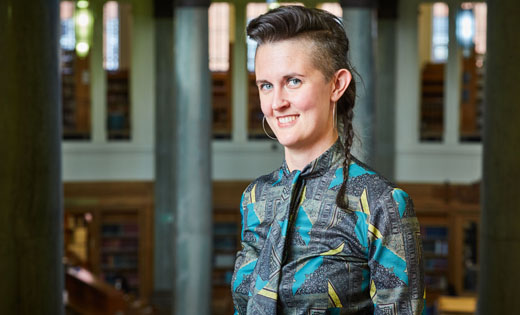 Funding has been secured by Dr Kimberly Campanello, poet and Lecturer in Creative Writing in the School of English at Leeds and a member of the University’s Poetry Centre, for a new collaborative project
Funding has been secured by Dr Kimberly Campanello, poet and Lecturer in Creative Writing in the School of English at Leeds and a member of the University’s Poetry Centre, for a new collaborative project
New chapter for Ireland’s most exciting literary voices
Three of Ireland’s most exciting literary voices have embarked on a major new collaborative project after securing funding.
A bursary of €20,000 has been presented to Dr Kimberly Campanello – poet and Lecturer in Creative Writing in the School of English at Leeds and a member of the University’s Poetry Centre – by Minister for Culture Josepha Madigan, on behalf of Ireland’s Arts Council and Department of Culture, Heritage and the Gaeltacht.
The Markievicz Awards honour Countess Constance de Markievicz, the first woman to be elected to Westminster parliament. The funding intends to improve the representation over time of the roles, experiences and ambition of women through original work across a wide variety of art forms.
(S)worn State(S) – Poems after Countess Constance Markievicz is a collaborative project by three of Ireland's most exciting literary voices: Dr Campanello, Annemarie Ní Churreáin and Dimitra Xidous.
Dr Campanello said: “The award allows the three of us to come together to write new poems that consider the role of women in Ireland in the decade of the centenaries and beyond.”
Taking the theme of 'witness' in the context of women's lives and the Irish State 2012-23 and beyond, the project will result in a suite of new poems and will be produced in a special letter-press publication by The Salvage Press.
Dr Campanello added: “(S)worn State(s) will evoke a wide range of ‘states’ of female embodiment and thought, including pleasure, joy, and experiences of intellectual interrogation.
“It will challenge ‘worn’ narratives of perpetual female suffering and self-alienation and remind readers that bodies think, that women move and think, in bodies.”
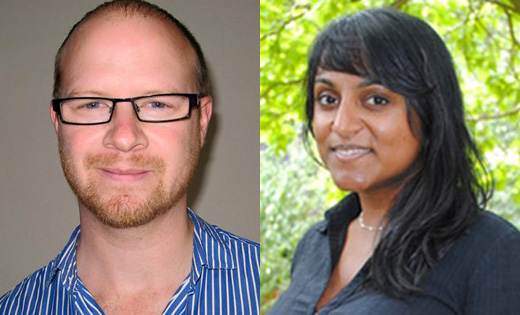 Keynote speakers Dr Michael Tomlinson and Dr Meera Sabaratnam
Keynote speakers Dr Michael Tomlinson and Dr Meera Sabaratnam
Call for Student Education Conference 2020 papers
Details have been announced about how colleagues can get involved in next year’s Student Education Conference (SEC).
Leeds Institute for Teaching Excellence (LITE) is inviting contributions for #SEC2020 (please use the hashtag for any social media), which will explore ‘student success’ as its theme.
Keynote speakers for the conference, which takes place on campus on Monday 6 and Tuesday 7 January 2020, have been announced.
Dr Michael Tomlinson, Associate Professor in Education and Director of the Professional Doctorate in Education at the University of Southampton, will present a talk on graduate capital of employability, while Dr Meera Sabaratnam, Senior Lecturer in International Relations and Chair of the Decolonising School of Oriental and Africa Studies Working Group, will speak on decolonising the curriculum.
And submissions for abstracts are now open.
Professor Tina Overton, LITE Director, said: “We are very much excited to be able to announce such engaging and relevant keynote speakers for #SEC2020.
“Both Michael and Meera are recognised and respected in their fields and I’m delighted we were able to secure them for our conference.
“We’ll be announcing our conference programme in due course, so please keep a lookout across our LITE Twitter account for further information, and we now look forward to receiving and reading your abstracts.”
Read the full story on For Staff, including details of how to make a submission.
 Book now to take part in the ESRC Festival of Social Science 2019
Book now to take part in the ESRC Festival of Social Science 2019
ESRC Festival of Social Science
Eight exciting events have been organised by Leeds Social Sciences Institute (LSSI) to celebrate the Economic and Research Council (ESRC) Festival of Social Science 2019.
Celebrating some of the country’s leading social science research, these will cover a wide range of topics, including the climate crisis, automation, language and job satisfaction!
The festival, which runs from 2-9 November, aims to:
- encourage, support and create the opportunity for social science researchers to engage with non-academic audiences
- promote and increase awareness of the social sciences and ESRC’s research
- promote and increase awareness of the contributions the social sciences make to the wellbeing and the economy of the UK society
- enable the public to engage with social science research; and
- engage with teachers and young people and to raise their awareness of the social sciences.
See the LSSI website for further information and to book your place at the Leeds events.
Teacher testers wanted for programming assessment tool
Two project leaders have put the call out for teachers of programming interested in trialling a new automated coding assessment tool to get in touch.
Dr Craig Evans and Dr Sam Wilson have developed the platform as part of their Leeds Institute for Teaching Excellence (LITE) project, to help them more accurately and effectively assess the programming skills of their students and provide better quality feedback.
The software, which is currently under development, could be ready as a beta version – a version made available for testing – during semester one, before its general release.
Now, the pair are seeking volunteer staff at Leeds to test out the new software.
Read the full story, including details of how to get involved in the project.
Research Development Funding applications
Academics can apply for awards of up to £500 to support patient/public/stakeholder involvement or engagement at the research design stage.
The deadline to apply is Friday 4 October. See the Public Engagement (PE) webpages, where you can read the guidance document and download an application form, or contact the PE team to discuss your application.
Research Spotlight video
Learn more about some of the incredible work taking place at Leeds in our new Research Spotlight video, available on Twitter, Facebook, YouTube and LinkedIn.
How to feature in future round-ups
Please contact Internal Communications if you or one of your colleagues would like to appear in this monthly feature.
Posted in: University newsResearch and innovation